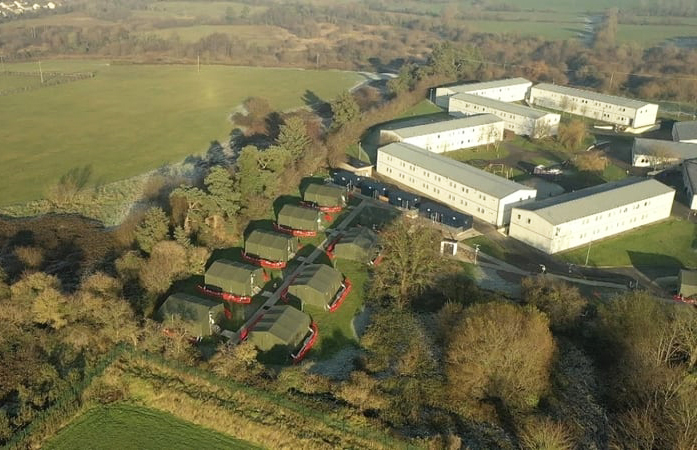
AN ALLEGATION of child abuse, unsafe fire practices, a threatening environment where drugs and alcohol are being abused, an almost doubling of numbers of people living in tents, and dirty accommodation were among the key problems uncovered by health watchdog HIQA following an inspection of the Knockalisheen International Protection Accommodation Centre.
A report published this week, following an unannounced inspection of the centre during two days in May last year, revealed that an allegation of physical abuse of a child was disclosed to inspectors which was so serious that a notification was made to the Child and Family Agency Tusla by HIQA.
The inspectors said in their report that “while the service provider had not previously been aware of this alleged incident, it demonstrated how some children living in the centre were exposed to potential risks and hazards which had not been appropriately identified or assessed through a risk management framework by the service provider”.
The inspectors found that children living in the centre “had limited opportunities to engage with staff members and the team were not aware of children’s views or their experience of living in the centre”.
This inspection was carried out to assess compliance with national standards for accommodation offered to people in the protection process.
The service providers, Aramark, were found to be non-compliant in 15 out of 24 aspects of the service inspected.
Overall, the inspectors found that residents living in the Knockalisheen accommodation centre “were not enjoying a good quality of life and experienced living conditions which at times compromised the dignity and safety of some adults and children”.
Tent showers and toilets unclean
HIQA stated that for the 299 residents living in the centre, 35 of which were children, there were “numerous risks relating to residents’ health safety and welfare and the temperature of the tented accommodation was not within an acceptable range”.
“Regular temperature checks were carried out, but no action was taken in response to these checks and residents lived in uncomfortable temperatures,” the report read.
Communal toilets and shower in the tented area were “not clean” at time of inspection.
HIQA described the catered food offering as “varied and of good quality”. Improvements had been made in the opening times of the dining room since HIQA’s last inspection.
The report added that some residents sourced their own cooking equipment and continued to cook in their living quarters, despite warning letters issued by the service provider in response to the fire risks this posed.
The report stated “the service provider had not considered or reviewed how they could reduce the related risks or to promote residents’ independence while awaiting a self-catering facility, such as better equipped kitchenettes”.
Inspectors said that “significant risks were evident in relation to fire safety. While residents were made aware of the evacuation procedures for the centre, the inspectors observed the fire alarm being activated during the inspection and there was a delayed response from the staff team and no response from the residents in the building.
“The fire alarm was defective and noticed to be on silent following activation. None of these risks were reflected on the centre’s risk register. In addition, fire containment measures were compromised across all buildings. For example, the inspectors observed fire doors to be wedged open, damaged and not closing correctly to ensure fire could be contained in all buildings.
“Despite requesting to view fire certification for the various buildings on the centre’s campus, these were not provided and the service provider was not aware which buildings, if any, had such certification in place. The inspectors issued an immediate action to the service provider in relation to fire safety concerns.”
Residents felt unsafe in the centre
Security arrangements in the centre were deemed “not adequate as some residents continued to feel unsafe and not adequately protected”.
“While security personnel were contracted on a 24-hour basis, seven days a week, this had not contributed to a feeling of safety amongst some residents,” the report found.
“As noted previously, there were reports from multiple residents about violence, intimidation, drugs, and alcohol misuse. Adults, including males and females, and children, reported that they felt unsafe in this centre.”
The rights of residents were not respected, safeguarded, promoted, or upheld in the centre, the report said. In particular, the tented residents had common shower facilities, no partitions between individual beds except a makeshift curtain they erected themselves, and not enough space to store belongings, resulting in personal items being kept on the floor and further reducing space.
“Some residents in this centre told inspectors that they did not feel comfortable raising concerns about their safety, and the overall culture of the centre needed serious consideration and review by the service provider,” the report continued.
‘The centre required a deep clean’
Cleaning schedules were updated and staff had engaged in training, “but this did not have the desired impacted as the inspectors found that many areas of the centre required a deep clean as well as a sustained and monitored cleaning programme,” according to the report.
Inspectors found a number of areas of improvement since their last inspection.
These included residents’ access to relevant services and information having improved. This inspection found that residents had access to information about health and social care services and there was personnel from a mental health service visiting the service weekly to support individuals, if they wished.
Staff recruitment had also improved and all staff had completed Garda vetting.
Aramark has implemented an incident management policy and procedure to ensure all adverse events, incidents, or potential incidents, are identified, documented, rectified, reviewed, and appropriately communicated.
Training has been provided to all management on the steps involved in reporting incidents to the relevant government bodies. It also confirmed that additional training for conflict management and management of violence and aggression was underway.
The report notes that safeguarding arrangements for children at the centre had improved.


